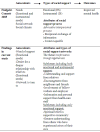The meaning and validation of social support networks for close family of persons with advanced cancer
- PMID: 22978508
- PMCID: PMC3488574
- DOI: 10.1186/1472-6955-11-17
The meaning and validation of social support networks for close family of persons with advanced cancer
Abstract
Background: To strengthen the mental well-being of close family of persons newly diagnosed as having cancer, it is necessary to acquire a greater understanding of their experiences of social support networks, so as to better assess what resources are available to them from such networks and what professional measures are required. The main aim of the present study was to explore the meaning of these networks for close family of adult persons in the early stage of treatment for advanced lung or gastrointestinal cancer. An additional aim was to validate the study's empirical findings by means of the Finfgeld-Connett conceptual model for social support. The intention was to investigate whether these findings were in accordance with previous research in nursing.
Methods: Seventeen family members with a relative who 8-14 weeks earlier had been diagnosed as having lung or gastrointestinal cancer were interviewed. The data were subjected to qualitative latent content analysis and validated by means of identifying antecedents and critical attributes.
Results: The meaning or main attribute of the social support network was expressed by the theme Confirmation through togetherness, based on six subthemes covering emotional and, to a lesser extent, instrumental support. Confirmation through togetherness derived principally from information, understanding, encouragement, involvement and spiritual community. Three subthemes were identified as the antecedents to social support: Need of support, Desire for a deeper relationship with relatives, Network to turn to. Social support involves reciprocal exchange of verbal and non-verbal information provided mainly by lay persons.
Conclusions: The study provides knowledge of the antecedents and attributes of social support networks, particularly from the perspective of close family of adult persons with advanced lung or gastrointestinal cancer. There is a need for measurement instruments that could encourage nurses and other health-care professionals to focus on family members' personal networks as a way to strengthen their mental health. There is also a need for further clarification of the meaning of social support versus caring during the whole illness trajectory of cancer from the family members' perspective.
Figures
References
-
- Winterling J, Wasteson E, Glimelius B, Sjoden PO, Nordin K. Substantial changes in life: perceptions in patients with newly diagnosed advanced cancer and their spouses. Cancer Nurs. 2004;27:381–388. - PubMed
LinkOut - more resources
Full Text Sources


